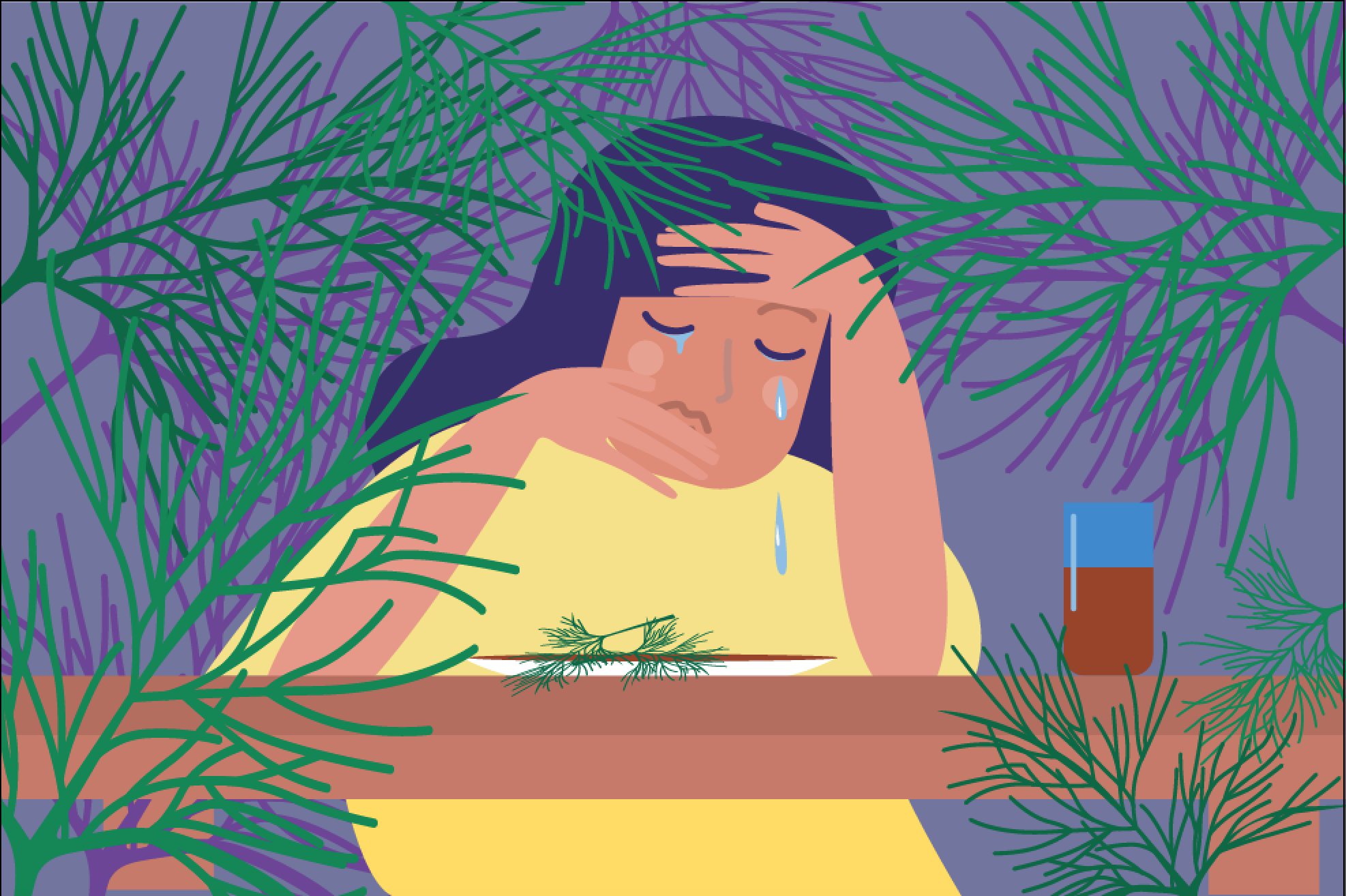Dill, dill, everywhere, and not a bite to eat

“I lost it today. There is too much dill here. This is a vile, nasty piece-of-shit little herb. My prayers tonight will be to ask God to send it back to whence it came.”
Alena RepkinaIt was a grim cold day in October, and around 2:30 p.m. I found myself silently crying harsh, salty tears into my lunch. Moments before I had texted a friend back in the UK on WhatsApp.
It merely read: “How did you live here?!!!!”
Shortly before that, I had hurried down to the office stolovaya, a little canteen-type café serving very Russian-style food. It is the sort of place the expression biznes lanch (business lunch) had not yet reached, and the nicely Slavic equivalent, delovoi obed still reigned supreme. The delovoi obed was not what I had opted for that day, though a few days before I had tucked into a nice dish of liver and onions with buckwheat, a side dish of beetroot and mayonnaise, mors, a lingonberry drink, and a chicken bouillon.
Ambushed again
I was disappointed then by the sheer amount of dill that had found its way into those dishes, so today I thought I could play it safe with a nice carrot salad and a potato pasty, or pirozhok. I bit into the pirozhok, and in an instant the upsettingly pungent tang of dill hit my tongue. It was at that moment too, that tears stung my eyes, and fanciful feelings of despair clouded my thoughts.
My friend replied straightaway, clearly worried by my four exclamation marks. I answered: “I lost it today. There is too much dill here. This is a vile, nasty piece-of-shit little herb. My prayers tonight will be to ask God to send it back to whence it came.”
Perhaps many Russians, and Ukrainians, and other people from Eastern Europe whose cuisine relies heavily on dill would find this an overreaction. A little herb such as this could hardly provoke a lapsed Catholic to pray for salvation – from dill that is, not for her soul. Could it?
The great dill divide
The thing is, many foreigners living in Russia share my sentiment. Search Google for “Dill + Russia” or simply “why do Russians eat so much dill?” and you will find a whole host of articles, web forums, and Buzzfeed articles puzzled by or disgusted with Russians’ love of the plant.
One article in The Guardian from 2015 by Shaun Walker titled “Dill with it: Russians’ obsession with the spindly herb menace” has already made the rounds on the internet, and has turned up on my Facebook newsfeed more than once. Walker uses a sublime metaphor to illustrate dill’s ability to ruin any dish it touches: “Dill, however, is the culinary equivalent of Francis Begbie from Trainspotting. It has walked in, unleashed a string of obscenities, and glassed you in the face before you even knew what was happening.”
Unfortunately, I could not agree with these words more. The evening after what we will call “the dill incident” in the stolovaya, part of my diary entry for that evening read: “Dill is everywhere. It makes a horrible smell, in a way that prawn shells that have been left in the bin for a couple of days make. It spreads through the kitchen, it hits the top of your stomach in the same way that the smell of damp and moldy fridges do. And yet it’s everywhere: I can smell it in cream, in milk, in burgers, in pies, in tea, even in my fridge – and my flat is a decidedly dill-free raion! It seems as though biscuits are the only foodstuffs that have escaped.”
Food is familiarity – and yearning
Of course, I understand that talking about a foodstuff like this sounds petty, childish and disrespectful of the culinary habits of the country I have taken up residence in. Food has a heady impact on the five senses: not merely taste, or smell – that subtly powerful and mysterious of senses – but also sight, feel, and even hearing. What is more beautiful sound of bacon snapping and crackling on a heavy cast-iron pan, the crunch of raw carrots, or even the wet slop of a thick soup that your mother has just made you being ladled into a bowl?
Food’s incredible connection with our senses means it can conjure powerful memories, as it is so easy to visualize in your head. Memories of food, then, are obviously closely linked with a sense of home, with childhood and happy times. This association with home and that feeling of removal from it is therefore what caused those tears to prick my eyes at lunch that day.
It is because of this that our relationship with food is so complicated and can provoke such serious reactions in us. It can make us happy, it can make us cry, and for many more reasons than for how it tastes.
Because it is not just the vile taste of dill that can cause an extreme reaction; for me it is a highly “foreign” herb. It reminds me that many of the comforting smells and tastes and textures that I love are missing from my life as an Englishwoman in Moscow, and it provokes an acute feeling of loss, of homesickness. This feeling is one that many Russians know very well.
Toska is a very Russian concept that cannot be directly translated into English but has become known in Western circles due to émigré Russians, most notably Nabokov. It of course has a much wider meaning than homesickness, but this yearning for someone or something or someplace, which is included in the definition of toska, is an intrinsic facet of homesickness. Food, especially home-cooked food, can play a part in this.
It’s not all about the food
Now, back to Russia and its cuisine. It seems unfair to concentrate on such a small part of what Russians eat in this article; there are plenty of delicious things that Russians eat. I am a big fan of mors; Russians are very good at making exquisite cakes and biscuits and other general foodstuffs to eat with tea; I also do like tvorog, (a type of curdled soured milk), and the other products that Russians like to make from milk; I have also mostly good things to say about olivye (a mayonnaise salad) and shashlik. Georgian cuisine can stay too.
However, I would have to say that the food is the thing that I probably like least about the place I live in. It’s rather unhealthy, bland, and there is a decided lack of nice cheap fruit and vegetables. There is also a hole in my heart where a nice slice of Cheddar should be. Traditional English food is not wholly renowned for its culinary delights of course, but sometimes the lack of easily available fresh produce in Russia can be upsetting, and I am unsure when this will change.
Food however, cannot rule everything; despite our extremely close connection to it for survival and for pleasure, other things can determine whether we can feel comfortable in a place. “People make the place,” my mother always told me, and it seems very true in this aspect. I am afraid that this is the time to get soppy: Moscow has many hidden pleasures, not least its people. They have overwhelmingly treated me very kindly and, perhaps most importantly, are all very happy to laugh along with me at the state of Russian cheese.
Daisy Gibbons is a 21-year-old student from the UK who came to Moscow in September 2016 to learn more Russian. She will soon be moving on from working as a teacher and an internship at RBTH to Nizhny Novgorod, where she will be studying Russian folklore.
Send your entries for this blog to x-patfiles@rbth.com
Read more: The perils of rooting for the away team in Russia’s far north>>>
Subscribe to get the hand picked best stories every week
All rights reserved by Rossiyskaya Gazeta.
Subscribe
to our newsletter!
Get the week's best stories straight to your inbox


